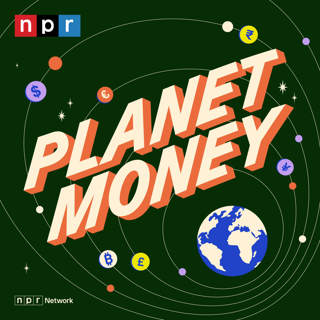
Financial advising while Black
After a successful career in advertising, Erika Williams decided it was time for a change. She went back to school to get an MBA at the University of Chicago, and eventually, in 2012, she got a job at Wells Fargo as a financial advisor. It was the very job she wanted.Erika is Black–and being a Black financial advisor at a big bank is relatively uncommon. Banking was one of the last white collar industries to really hire Black employees. And when Erika gets to her office, she's barely situated before she starts to get a weird feeling. She feels like her coworkers are acting strangely around her."I was just met with a lot of stares. And then the stares just turned to just, I mean, they just pretty much ignored me. And that was my first day, and that was my second day. And it was really every day until I left."She wasn't sure whether to call her experience racism...until she learned that there were other Black employees at other Wells Fargo offices feeling the exact same way.On today's episode, Erika's journey through these halls of money and power. And why her story is not unique, but is just one piece of the larger puzzle.Help support Planet Money and get bonus episodes by subscribing to Planet Money+ in Apple Podcasts or at plus.npr.org/planetmoney.Learn more about sponsor message choices: podcastchoices.com/adchoicesNPR Privacy Policy
28 Apr 202327min

The zoo economy (classic)
Note: This episode originally aired in September, 2014.Zoos follow a fundamental principle: You can't sell or buy the animals. It's unethical and illegal to put a price tag on an elephant's head. But money is really useful — it lets you know who wants something and how much they want it. It lets you get rid of things you don't need and acquire things that you do need. It helps allocate assets where they are most valued. In this case, those assets are alive, and they need a safe home in the right climate.So zoos and aquariums are left asking: What do you do in a world where you can't use money?This episode was originally produced by Jess Jiang.Help support Planet Money and get bonus episodes by subscribing to Planet Money+ in Apple Podcasts or at plus.npr.org/planetmoney.Learn more about sponsor message choices: podcastchoices.com/adchoicesNPR Privacy Policy
26 Apr 202316min

The quest for the factory-built house
Imagine if we built cars the same way we build houses. First, a typical buyer would meet with the car designer, and tell them what kind of car they want. Then the designer would draw up plans for the car.The buyer would call different car builders in their town and show them the blueprints. And the builders might say, "Yeah, I can build you that car based on this blueprint. It will cost $1 million and it will be ready in a year and a half."There are lots of reasons why homes are so expensive in the U.S., zoning and land prices among them. But also, the way we build houses is very slow and very inefficient. So, why don't we build homes the way we build so many other things, by mass producing them in a factory?In this episode, the century-old dream of the factory-built house, and the possibility of a prefab future.This episode was produced by Emma Peaslee. Molly Messick edited the show, and it was fact-checked by Sierra Juarez. Brian Jarboe mastered the episode. Jess Jiang is our acting Executive Producer.Help support Planet Money and get bonus episodes by subscribing to Planet Money+ in Apple Podcasts or at plus.npr.org/planetmoney.Learn more about sponsor message choices: podcastchoices.com/adchoicesNPR Privacy Policy
21 Apr 202326min

Tax Code Switch
This past January, researchers uncovered that Black taxpayers are three to five times as likely to be audited as everyone else. One likely reason for this is that the IRS disproportionately audits lower-income earners who claim a tax benefit called the earned income tax credit. And this, says law professor Dorothy Brown, is just one example of the many ways that race is woven through our tax system, its history, and its enforcement.Dorothy discovered the hidden relationship between race and the tax system sort of by accident, when she was helping her parents with their tax return. The amount they paid seemed too high. Eventually, her curiosity about that observation spawned a whole area of study.This episode is a collaboration with NPR's Code Switch podcast. Host Gene Demby spoke to Dorothy Brown about how race and taxes play out in marriage, housing, and student debt.This episode was produced by James Sneed, with help from Olivia Chilkoti. It was edited by Dalia Mortada and Courtney Stein, and engineered by James Willets & Brian Jarboe.Help support Planet Money and get bonus episodes by subscribing to Planet Money+ in Apple Podcasts or at plus.npr.org/planetmoney.Learn more about sponsor message choices: podcastchoices.com/adchoicesNPR Privacy Policy
19 Apr 202324min

The life and possible death of low interest rates
Right now, the economy is running hot. Inflation is high, and central banks are pushing up interest rates to fight it. But before the pandemic, economies around the world were stuck in a different rut: low inflation, low interest rates, low growth. In 2013, Larry Summers unearthed an old term from the Great Depression to explain why the economy was in this rut: secular stagnation. The theory resonated with Olivier Blanchard, another leading scholar, because he had made similar observations himself. Larry and Olivier would go on to build a case for why secular stagnation was a defining theory of the economy and why government policies needed to respond to it. They helped reshape many people's understanding of the economy, and suggested that this period of slow growth and low interest rates was here to stay for a long time.But today, Larry and Olivier are no longer the duo they used to be. As inflation has spiked worldwide, interest rates have followed suit. Earlier this year, Larry announced that he was no longer on the secular stagnation train. Olivier, meanwhile, believes we're just going through a minor blip and will return to a period of low interest rates within the near future. He doesn't see the deep forces that led to a long-run decline in interest rates as just vanishing. Who's right? The future of the global economy could depend on the answer.Help support Planet Money by subscribing to Planet Money+ in Apple Podcasts or at plus.npr.org/planetmoney.Learn more about sponsor message choices: podcastchoices.com/adchoicesNPR Privacy Policy
15 Apr 202325min

Two innovation market indicators
Right now, the economy is all over the place. And when things get confusing, we look to basic economic indicators to help explain what's going on. Today, we're bringing you two episodes of our daily show The Indicator that focus on the bond market.The market for U.S. treasury bonds is generally safe, predictable and pretty boring. Recently, though, it's been anything but. We look into the fluctuations in bond prices and the yield curve (one of our favorite indicators) to try to help us understand where the economy stands right now.These two Indicator episodes were originally produced by Brittany Cronin and Noah Glick. They were fact-checked by Sierra Juarez and engineered by Gilly Moon and Katherine Silva. Kate Concannon edits The Indicator.The Planet Money version was produced by Dylan Sloan and edited by Dave Blanchard. Music: "Funk Lounge," "A Fulltime Job" and "Velvet Groove." Help support Planet Money and get bonus episodes by subscribing to Planet Money+ in Apple Podcasts or at plus.npr.org/planetmoney.Learn more about sponsor message choices: podcastchoices.com/adchoicesNPR Privacy Policy
12 Apr 202318min

Your banking questions, answered
It's been a month since the collapse of Silicon Valley Bank touched off the worst episode of banking turmoil since 2008. While the financial system appears to have stabilized, we're still reckoning with what happened. Regulators are getting dragged before Congress. The Federal Reserve and the FDIC have promised reports on what went wrong with bank oversight. And judging by our inbox, you, our listeners, have a lot of lingering questions.Questions like: Was it a bailout? Where were the regulators? Is it over yet? And what about those other banks that were teetering on the edge?Today on the show, some answers for you.This episode was produced by Sam Yellowhorse Kesler with help from Willa Rubin. It was engineered by Brian Jarboe. It was fact-checked by Sierra Juarez and edited by Molly Messick. Jess Jiang is our acting executive producer. Help support Planet Money and get bonus episodes by subscribing to Planet Money+ in Apple Podcasts or at plus.npr.org/planetmoney.Learn more about sponsor message choices: podcastchoices.com/adchoicesNPR Privacy Policy
8 Apr 202326min

The battle for Puerto Rico's beaches
Puerto Rico's beaches are an integral part of life on the island, and by law, they're one of the few places that are truly public. In practice, the sandy stretch of land where the water meets the shore is one of the island's most contested spaces.Today we're featuring an episode of the podcast La Brega from WNYC Studios and Futuro Studios, a show about Puerto Rico and the Puerto Rican experience. On the island, a legal definition dating back to the Spanish colonial period dictates what counts as a beach. But climate change, an influx of new residents and a real estate boom are all threatening legal public access to some of Puerto Rico's most cherished spaces. The debate all comes down to one question: what counts as a beach?You can listen to the rest of La Brega (in English and Spanish) here. They have two full seasons out, which explore the Puerto Rican experience through history and culture. Check it out.This episode was reported by Alana Casanova-Burgess and produced by Ezequiel Rodriguez Andino and Joaquin Cotler, with help from Tasha Sandoval. It was edited by Mark Pagan, Marlon Bishop, and Jenny Lawton and engineered by Joe Plourde. The zona maritimo terrestre was sung as a bolero by Los Rivera Destino.The Planet Money version was produced by Dave Blanchard, fact checked by Sierra Juarez, edited by Keith Romer, and engineered by Brian Jarboe.Help support Planet Money and get bonus episodes by subscribing to Planet Money+ in Apple Podcasts or at plus.npr.org/planetmoney.Learn more about sponsor message choices: podcastchoices.com/adchoicesNPR Privacy Policy
5 Apr 202323min






















